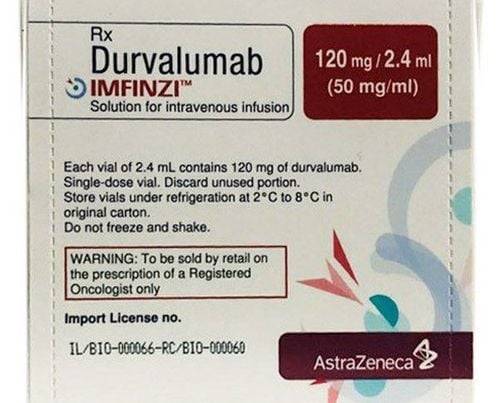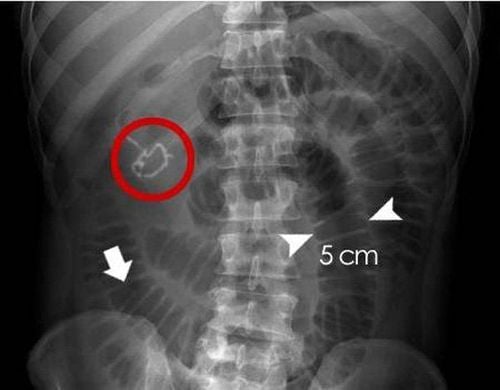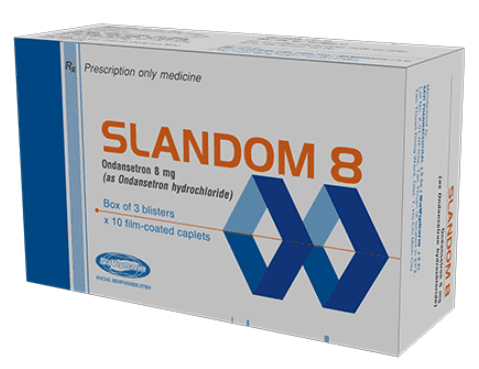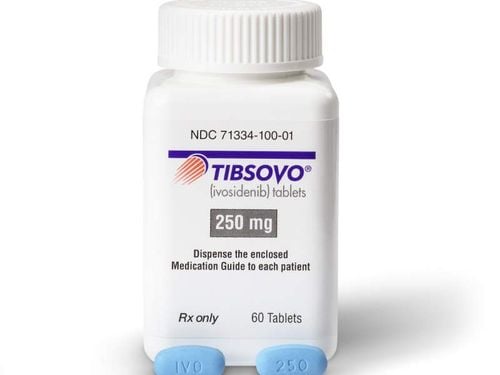This is an automatically translated article.
Small bowel cancer is a rare disease caused by changes in the cells in the tissues of the small intestine. These cells grow out of control and can form a mass or tumor.
1.Small Intestinal Cancer Overview The small intestine is the part of the digestive tract that has the function of absorbing nutrients for the body. The small intestine connects the stomach and the colon, divided into 3 main parts including:
duodenum: consecutive stomach jejunum : middle part ileum: the last part, continuous with colon Small intestine cancer occurs when intestinal cells mutate and grow out of control, forming a tumor. There are 5 main types of small bowel cancer:
Adenocarcinoma: the most common form of small bowel cancer, usually occurring in the duodenum and jejunum. Adenocarcinoma begins in the glandular cells of the small intestine. Sarcoma: Tumor that develops from the muscular layer of the small intestine, usually in the ileum. GIST Neuroendocrine tumor Lymphoma. 2.Causes of Small Intestinal Cancer The cause of small bowel cancer has not been clearly identified. Some factors that increase the risk of the disease include:
Crohn's disease: a chronic inflammatory disease of the digestive tract. Patients with Crohn's disease have a higher risk of colon and small bowel cancers. Celiac disease: The body's immune system reacts to the Gluten protein in wheat, oats ... and causes the breakdown of the small intestine epithelium. Familial adenomatous polyposis (FAP): an inherited disease with dozens to hundreds of polyps in the gastrointestinal tract (mostly colorectal, some in the small intestine and stomach). FAP patients have a higher risk of gastrointestinal cancers (stomach cancer, duodenal cancer, thyroid cancer...)
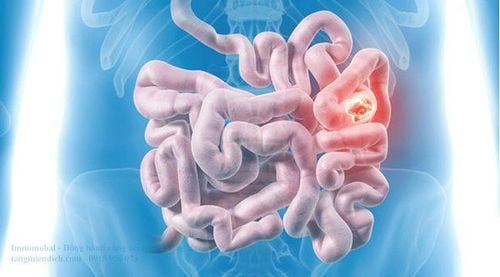
Ung thư ruột non xảy ra khi các tế bào ruột bị biến đổi
3.Symptoms of Small Intestinal Cancer Symptoms of small bowel cancer in the early stages are often not obvious. Patients may come to the doctor with the following symptoms. However, these symptoms are not specific and can be seen in other gastrointestinal diseases:
Blood in the stool: small bowel cancer rarely has bright red blood in the stool, most patients have black stools. , color like coffee grounds, rotten smell Diarrhea: is the condition of passing watery stools > 3 times/day. Abdominal tumor: often discovered by patients by chance or through abdominal examination by a doctor Abdominal pain: dull, vague, rarely severe pain Unexplained weight loss, common in bowel cancer late stage. Vomiting or nausea. Small bowel cancer is divided into 4 stages based on tumor characteristics, lymph node metastasis and distant metastasis:
Small bowel cancer stage 1: cancer develops in only the layers of the small intestine, does not invade tissue Surrounding and lymph nodes Stage 2 small bowel cancer: cancer has grown beyond the bowel wall and has invaded surrounding tissue but has not metastasized to lymph nodes. Small bowel cancer stage 3A: Cancer has metastasized to 1-3 regional lymph nodes, which may or may not extend beyond the intestinal wall but no distant metastasis Small bowel cancer stage 3B: Cancer has spread to 4 regional lymph nodes Intestinal obstruction, whether or not it extends beyond the intestinal wall but without distant metastases End-stage small bowel cancer (4): distant metastasis to other organs (lung, liver, etc.)

Đau bụng là một triệu chứng của ung thư ruột non
4.Risk subjects for small bowel cancer Older age (average age of small bowel cancer is 60) Gender (men are more affected than women) Some genetic diseases such as adenomatous polyposis syndrome are family (FAP) Smokers and drinkers Diet high in animal fats High exposure to toxic chemicals such as phenoxyacetic acid... 5.Prevention of small bowel cancer Do not smoke, limit Drink alcohol Eat healthy, limit fried foods, processed foods, eat a lot of green vegetables, grains Patients with Crohn's disease, Celiac disease, FAP disease should have regular screening every 6 months. 6.Measures to diagnose Small Intestinal Cancer Tests used in the diagnosis of small bowel cancer:
Blood tests: the number of red blood cells, hemoglobin decreases if the patient has bleeding. Liver and kidney function tests are used to determine if the tumor has affected other organs. Abdominal X-ray: Unprepared abdominal X-ray or barium-enhanced small bowel biopsy Biopsy: pathological biopsy is the main criterion in the diagnosis of small bowel cancer.

Phẫu thuật là phương pháp điều trị chính của ung thư ruột non
7.Measures to treat Small Intestinal Cancer Can small bowel cancer be cured? Treatment of small bowel cancer is multimodal. The choice of treatment regimen depends on several factors including: the stage and type of cancer; side effects of treatment, patient preferences, and general health of the patient.
The main methods in the treatment of small bowel cancer:
Surgery:
As the main treatment, remove the tumor and invasive organs, restore the gastrointestinal tract. Complications of surgery: bleeding, infection after surgery, wound pain, digestive disorders (constipation, diarrhea).. Chemical:
Is a method of using drugs to destroy cancer cells. Side effects of chemotherapy: fatigue, risk of infection due to leukopenia, vomiting and nausea, hair loss, loss of appetite, diarrhea.. Immunotherapy:
An advanced method, using the immune system itself. patient's immune system to fight cancer cells Certain immunotherapies such as vaccines, antibodies, and interferons. Radiation therapy:
Radiation therapy is not usually used as the main treatment in small bowel cancer. Radiation therapy is indicated in symptomatic treatment when the disease is at an advanced stage. Complications of radiation therapy: fatigue, mild skin reactions, digestive disorders,...
Please dial HOTLINE for more information or register for an appointment HERE. Download MyVinmec app to make appointments faster and to manage your bookings easily.
SEE MOREColonoscopy with capsules How long is the small intestine and large intestine? Structure and function of the small intestine





